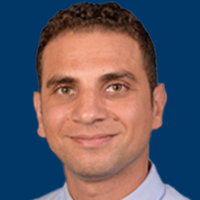Mosunetuzumab Monotherapy Continues to Demonstrate Durable Responses in Patients with Relapsed and/or Refractory Follicular Lymphoma after ≥2 Prior Therapies: 3-Year Follow-up from a Pivotal Phase II Study
Elizabeth Budde, MD, PhD, presents data from the 3-year follow-up from a pivotal phase II study investigating mosunetuzumab monotherapy in patients with relapsed and/or refractory follicular lymphoma after ≥2 prior therapies.
Background
- Mosunetuzumab is a CD20xCD3 T-cell engaging bispecific antibody that redirects T cells to eliminate malignant B cells.
- In a pivotal Phase II study (NCT02500407), mosunetuzumab demonstrated a high complete response (CR) rate with a manageable safety profile in patients with relapsed/refractory (R/R) follicular lymphoma (FL) and ≥2 prior lines of therapy (Budde et al. Lancet Oncol 2022).
- Mosunetuzumab is a fixed-duration treatment that can be administered in an outpatient setting.
- Here, we present updated data for patients with R/R FL and ≥2 prior lines of therapy, after 3 years of follow-up.
Methods
- Eligible patients with R/R FL Grade (Gr) 1–3a and ≥2 prior therapies received intravenous mosunetuzumab in 21-day cycles with step-up dosing in Cycle (C) 1 (C1 Day [D] 1, 1mg; C1D8, 2mg; C1D15/C2D1, 60mg; C3D1 and onwards, 30mg).
- Hospitalization for treatment was not required.
- Patients achieving a CR by C8 completed treatment without additional cycles; patients with a partial response or stable disease received a total of 17 cycles.
- The primary endpoint was CR rate as determined by an Independent Review Committee (as best response; Cheson 2007 criteria). Duration of response (DOR), duration of complete response (DOCR), progression-free survival (PFS), event-free survival (EFS), and safety were secondary endpoints. Time to next treatment (TTNT), response to retreatment, biomarkers of minimal residual disease (MRD), and circulating B-cell counts were exploratory endpoints.
Results
- Ninety patients with R/R FL were enrolled.
- As of May 2, 2023, median time on study was 37.4 (range: 2.0–48.0) months.
- Investigator-assessed best overall response and CR rates were 77.8% (95% CI: 67.8–85.9) and 60.0% (95% CI: 49.1–70.2), respectively. The median DOR was 35.9 months (95% CI: 20.7–not reached [NR]). Median DOCR was NR (95% CI: 33.0–NR); the estimated 30-month DOCR rate was 72.4% (95% CI: 59.2–85.6) (Table). Three years after the end of treatment, 57.1% of 70 responding patients were alive and disease progression-free. Median PFS was 24.0 months (95% CI: 12.0–NR). The median TTNT was 37.3 months (95% CI: 18.0–NR); estimated EFS at 36 months was 51.8% (95% CI: 40.8–62.8).
- After initial mosunetuzumab treatment, 34/90 (37.8%) patients had received a new anti-lymphoma therapy, including 33/90 (36.7%) patients who received a new systemic treatment (8/33 [24.2%] of these patients received chimeric antigen receptor T-cell therapy); 8/90 (8.9%) had radiotherapy; 2/90 (2.2%) had excision of tumor; 2/90 (2.2%) had an allogeneic stem cell transplant; and 1/90 (1.1%) had an autologous stem cell transplant. Five patients received retreatment with mosunetuzumab, 3/5 of these patients had a CR.
- No new cytokine release syndrome (CRS) events, serious, or Gr ≥3 adverse events (AEs) were reported since the previous analysis (median follow-up of 28.3 months; Bartlett et al. ASH 2022). CRS events occurred in 44.4% of patients and 2.2% were Gr 3/4 in severity; all CRS events resolved.
- Overall AEs and serious AEs were comparable to the previous analysis (Bartlett et al. ASH 2022); febrile neutropenia was not reported. Forty-six (51.1%) patients experienced Gr 3/4 AEs related to mosunetuzumab; the rate of AEs leading to discontinuation was low (4.4%). Peripheral blood B-cell depletion following treatment with mosunetuzumab occurred in all patients, and recovery was observed after a median of 18 months following the end of treatment in patients with a sustained response using follow-up samples. MRD kinetics following mosunetuzumab therapy will be presented.
Conclusions
- In this updated analysis, with a median follow-up of 37.4 months, durable responses continued to be observed with fixed-duration mosunetuzumab in patients with R/R FL. The manageable safety profile was consistent with previous reports. Evidence of B-cell recovery was observed after a median of 18 months following the end of treatment.
Schuster S, Sehn L, Bartlett N et al. Mosunetuzumab Monotherapy Continues to Demonstrate Durable Responses in Patients with Relapsed and/or Refractory Follicular Lymphoma after ≥2 Prior Therapies: 3-Year Follow-up from a Pivotal Phase II Study. Presented at: 65th ASH Annual Meeting and Exposition, December 9-12, 2023. San Diego, California.
Related Content



